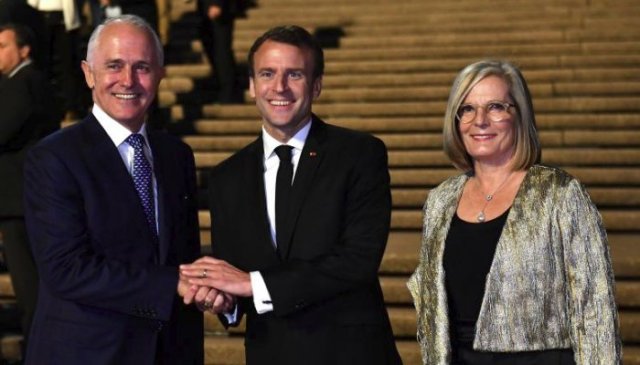Dear Sagar Media Inc,Petitioning to RBI, Governor Urjit
|
Macron thanks Australian PM
France’s President Emmanuel Macron may have had le vin rouge on his mind when he thanked Australian Prime Minister Malcolm Turnbull and his “delicious wife” for their warm welcome on his official visit.

Macron and Turnbull had navigated their way through several sensitive diplomatic issues at a news conference in Sydney on Wednesday, only for the president to make the linguistic slip while making closing remarks in English.
He thanked Turnbull and his wife, Lucy, for being good hosts and acknowledged the fine food and wine he had enjoyed on his visit, before exclaiming: “I want to thank you for your welcome, you and your delicious wife for the warm welcome.”
The comment lit up social media, replacing discussion about the leaders’ deliberations on more weighty issues such as China’s growing influence in the region.
But what exactly did Macron try to say?
He may have had the word “delicieux” in mind, which, though sounding similar to “delicious,” would better translate into “lovely” or “delightful.”
While more often used to describe a pastry or a meal, the word “delicieux” can also describe a person, even if it is a somewhat old-fashioned usage.
Dominican Republic break ties with Taiwan
Chinese government has announced that it has established diplomatic ties with the Dominican Republic in the Caribbean, which in turn cut its ties with Taiwan.
Taiwanese media severely criticized China, reporting that the Chinese government pledged 3-billion dollars in loans to the Dominican Republic.
Chinese Foreign Minister Wang Yi and his Dominican counterpart, Miguel Vargas, gave a joint news conference in Beijing on Tuesday, disclosing that the 2 countries have formed diplomatic relations.
In a joint statement, the Dominican Republic said that “there is only one China in the world.” It severed diplomatic ties with Taiwan on the day.
Taiwan’s media quoted Taiwan officials as saying that the Chinese government promised to extend 3-billion dollars in loans for developing infrastructure, including railways and highways.
The sum would account for more than 20 percent of the island nation’s annual state budget. Taiwan is severely criticizing the Chinese government for promising such a huge loan package in order to establish diplomatic ties with the Dominican Republic.
As a result, Taiwan is left with diplomatic ties with only 19 countries — the smallest number ever. The Chinese government is seen to be applying increasing diplomatic pressure to isolate Taiwan’s Tsai Ing-wen government.
Cambridge Analytica winds up
Cambridge Analytica, the political consultancy firm at the center of the Facebook data privacy scandal, is shutting down, the Wall Street Journal reports. In March, it emerged that Facebook had exposed the data of up to 87 million users to the firm’s researchers. Last month, the company suspended its CEO Alexander Nix, ahead of investigations to determine whether it had engaged in any wrongdoing.
Explosion at Lag BaOmer,Jewish festive in London
30 people have been injured in an explosion during a celebration of lag BaOmer Jewish festival, in north London late Wednesday.
The explosion was reportedly sparked by mobile phones being thrown into bonfires, which are a tradition for Lag BaOmer, an annual Jewish festive event.
Hundreds gathered in Stamford Hill at the time. Around 10 people are believed to have been injured by the fire, while 20 others injured in the scramble to escape, local media reported.
American detained freed in N Korea
North Korea has reportedly transferred three American prisoners out of labor camps into a hotel, ahead of the planned summit between Kim Jong-un and Donald Trump. According to a South Korean activist representing ‘Family Assembly of those Abducted to North Korea’, the three, Kim Hak-song, Kim Sang-duk and Kim Dong-chul, were moved to the outskirts of Pyongyang sometime in mid-April. The detainees, convicted of “hostile acts” against the North Korean government and people, are widely expected to be freed as a goodwill gesture ahead of the much-anticipated talks.


No comments:
Post a Comment